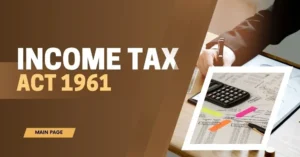The Income Tax Act of 1961 is an important law in India that sets the rules for how income is taxed in the country. Passed by the Indian Parliament, this act is the foundation of income tax laws in India. It explains how taxes on income should be calculated, collected, and enforced. This guide will help you understand the main features, goals, and effects of the Income Tax Act of 1961 in a clear and simple way.
Introduction to Income Tax Act 1961
The Income Tax Act of 1961 was created to bring together and update the rules about income tax in India. It replaced the old Income Tax Act of 1922, which was no longer suitable for the changing economic activities. The new act started on April 1, 1962, and has been updated many times since to adapt to new economic conditions and tax policies.
Objectives of the Income Tax Act 1961
The primary objectives of the Income Tax Act 1961 are:
- Revenue Generation: The Income Tax Act helps the government collect money to fund public services and build infrastructure.
- Fair Wealth Distribution: It ensures that people who earn more pay higher taxes, promoting a fair distribution of wealth.
- Economic Regulation: The Act encourages investments in certain areas by offering tax breaks and incentives.
- Compliance and Enforcement: It sets up rules for assessing, collecting, and enforcing taxes to ensure everyone follows the law.
Key Features of the Income Tax Act 1961
The Income Tax Act of 1961 is a detailed law that governs how income tax is managed in India. Some of its main features are:
Income Categories
The act classifies income into five main categories, also known as heads of income:
- Salaries: Income earned from employment.
- Income from House Property: Earnings from owning and renting out property.
- Profits and Gains of Business or Profession: Income from business activities or professional services.
- Capital Gains: Profit from the sale of capital assets such as property, stocks, and bonds.
- Income from Other Sources: Any other income not covered under the above categories, such as interest, dividends, and gifts.
Tax Rates and Slabs
The Income Tax Act of 1961 sets different tax rates and categories for various types of taxpayers like individuals, Hindu Undivided Families (HUFs), firms, and companies. The tax rates are progressive, which means that as your income increases, you pay a higher percentage in taxes. This system ensures that people with higher incomes contribute more to taxes, promoting fairness.
Deductions and Exemptions
The Income Tax Act offers various deductions and exemptions to help people save money and encourage investments. Here’s a simple breakdown:
- Section 80C: You can get tax deductions if you invest in things like the Public Provident Fund (PPF), National Savings Certificate (NSC), or pay life insurance premiums.
- Section 80D: You can save on taxes by paying for medical insurance premiums.
- Section 24: If you have a home loan, the interest you pay on it can reduce your taxable income.
- Section 10: Some types of income, like money earned from agriculture, scholarships, and certain allowances, are not taxed.
These provisions are there to lower your tax bill and motivate you to save and invest wisely.
Tax Filing and Assessment
The Income Tax Act of 1961 explains how people need to file their income tax returns, pay taxes, and how their tax responsibilities are calculated. Everyone who earns income is required to file a tax return each year. The income tax department then reviews these returns to figure out how much tax each person needs to pay. The act also sets different deadlines for different types of taxpayers and gives instructions on how the tax review process works.
Penalties and Prosecution
The act imposes penalties if you don’t follow the rules, like not filing tax returns, reporting less income than you actually earned, or not paying taxes. In serious cases, it can even lead to legal action and jail time. This is to make sure people pay their taxes on time and follow the law.
Also Read :
All GST Full Forms
Explore About GST or GST Full Form
About ITC and ITC Full Form in GST
Amendments and Updates
Since it was created, the Income Tax Act of 1961 has gone through many changes to keep up with the evolving economy and policy goals. These changes are made through the Finance Act, which is presented every year in Parliament as part of the Union Budget. Some key changes include:
- Introduction of GST: In 2017, the Goods and Services Tax (GST) was introduced, which changed the way taxes are applied, leading to updates in income tax rules related to indirect taxes.
- Demonetization: In 2016, demonetization led to stricter checks on cash transactions and changes in laws to reduce black money.
- Digital Transactions: To encourage cashless payments, several benefits and rules have been added to promote digital transactions.
Role of Income Tax Department
The Income Tax Department manages the Income Tax Act 1961. It operates under the Ministry of Finance and is led by the Central Board of Direct Taxes (CBDT). Here’s what it does:
- Assessment and Collection: Figures out how much tax people owe and makes sure they pay it.
- Enforcement: Checks that everyone follows tax rules by doing audits and investigations.
- Taxpayer Services: Helps people with tax issues, processes refunds, and gives advice on tax matters.
- Policy Formulation: Helps create and update tax rules and suggests changes to the Income Tax Act.
Important Sections of Income Tax Act 1961
The Income Tax Act 1961 is divided into many sections, each dealing with specific aspects of income tax law. Some important sections include:
Section 139: Filing of Income Tax Returns
Section 139 deals with the rules for filing income tax returns. It sets deadlines for when different types of taxpayers need to file their returns. If you don’t file on time or miss the deadline, there can be penalties and other consequences. So, it’s important to file your tax returns on time to avoid these issues and follow the law.
Section 143: Assessment of Income
Section 143 of the Income Tax Act covers how income tax returns are reviewed and assessed. It includes:
- Summary Assessment: This is a quick check of the return to see if everything looks okay.
- Regular Assessment: A more detailed review if the return needs closer inspection.
- Best Judgment Assessment: If the return isn’t clear or complete, the tax authorities estimate the tax based on available information.
Overall, this section ensures that the correct amount of tax is determined based on the information provided in the return.
Section 147: Reassessment of Income
Section 147 of the Income Tax Act gives tax officials the power to review and adjust past tax returns if they think some income was missed or incorrectly reported. This means they can reopen old cases and reassess the taxes owed if new information or evidence comes up. It’s an important tool for catching and correcting any mistakes or attempts at tax evasion.
Section 192: TDS on Salary
Section 192 says that employers must take tax out of their employees’ salaries before paying them. The employer then sends this tax directly to the government. This way, employees don’t have to worry about paying their taxes separately.
Section 234A, 234B, and 234C: Interest on Late Payment
These sections outline the interest taxpayers must pay for three things:
- Late Filing (234A): If you file your tax return late, you’ll have to pay interest.
- Non-Payment or Short Payment of Advance Tax (234B): If you don’t pay your advance tax on time or pay less than required, you’ll be charged interest.
- Deferment of Advance Tax (234C): If you delay paying your advance tax in installments, interest will be added.
These rules help encourage timely tax payments and ensure you follow the tax deadlines.
Recent Developments and Trends
The Income Tax Act 1961 is continually evolving to address new challenges and align with global best practices. Some recent developments include:
Introduction of Faceless Assessment
To make things clearer and cut down on direct contact, the government started the faceless assessment scheme. This means that tax assessments are done online, so there’s no face-to-face interaction between taxpayers and tax officials. This approach helps reduce corruption and makes sure that the assessment process is fair and unbiased.
Taxation of Digital Economy
In simple terms, new rules have been set up to tax income from online services and transactions. The idea of “Significant Economic Presence” (SEP) has been added to make sure that digital businesses pay taxes in India, even if they don’t have a physical office or store in the country. This way, these businesses still contribute to India’s tax system fairly.
Simplification of Tax Laws
Efforts are underway to make tax laws and procedures simpler. The goal is to reduce the hassle for taxpayers and help them understand and follow the rules more easily. This includes making tax forms easier to fill out, offering online filing options, and providing clear instructions.
Conclusion
The Income Tax Act of 1961 is an important law in India that deals with how people and businesses pay taxes. It helps the government collect money and make sure the economy is fair. The act has many rules that change from time to time to keep up with economic changes. It’s important for everyone, including individuals, tax experts, and businesses, to understand these rules to stay compliant and make smart financial choices.
Also Read
- Explore About Income Tax Act 1961The Income Tax Act of 1961 is an important law in India that sets the rules for how income is taxed in the country. Passed by the Indian Parliament, this act is the foundation of income tax laws in India.… Read more: Explore About Income Tax Act 1961
- About ITC and ITC Full Form in GSTWhen it comes to the Goods and Services Tax (GST), the term ITC is frequently encountered. The full form of ITC is “Input Tax Credit.” In this comprehensive guide, we will explore the concept of ITC, its importance, how it… Read more: About ITC and ITC Full Form in GST
- All GST Full FormsThe Goods and Services Tax (GST) is a comprehensive tax levied on the manufacture, sale, and consumption of goods and services in India. Understanding the various terms and abbreviations related to GST is crucial for businesses and individuals alike. In… Read more: All GST Full Forms
- Explore About GST or GST Full FormThe term GST stands for Goods and Services Tax. It is a comprehensive, multi-stage, destination-based tax that is levied on every value addition. GST has replaced many indirect taxes in India, such as excise duty, VAT, services tax, and more.… Read more: Explore About GST or GST Full Form
Frequently Asked Questions
What is the Income Tax Act 1961?
The Income Tax Act 1961 is an important law in India that deals with how income tax is collected and managed. Created by the Parliament, this law sets out the rules for figuring out how much tax people and businesses need to pay. It divides income into different types, tells us what tax rates apply, and explains how to claim deductions and exemptions. It also requires people to file tax returns. The act is updated regularly to keep up with changes in the economy and tax policies, helping the government manage finances and generate revenue.
What are the main objectives of the Income Tax Act 1961?
The Income Tax Act 1961 has a few main goals. First, it helps the government collect money needed for public services. It aims to make sure that wealth is shared more fairly by taxing higher earners more. The act also sets rules for how people and businesses should pay taxes and helps prevent cheating on taxes. By giving tax benefits, it encourages people to invest, and it ensures taxes are collected in a straightforward and efficient way. Overall, it helps keep the economy transparent and regulates financial activities.
How does the Income Tax Act 1961 classify income?
The Income Tax Act 1961 organizes income into five main categories to simplify how it is assessed and taxed. First, Salaries include earnings from employment. Next, Income from House Property covers rental income from properties you own. Profits and Gains of Business or Profession refer to money made from running a business or practicing a profession. Capital Gains deal with profits from selling assets like property or stocks. Lastly, Income from Other Sources includes earnings from things like interest, dividends, and gifts. This classification ensures each type of income is taxed appropriately.
What are the tax rates and slabs under the Income Tax Act 1961?
The Income Tax Act of 1961 sets different tax rates for various types of taxpayers, including individuals, Hindu Undivided Families (HUFs), firms, and companies. The tax system is designed to be fair by charging higher rates on higher incomes. For individuals, the tax rates are divided into different income levels: up to ₹2.5 lakh, ₹2.5-5 lakh, ₹5-10 lakh, and over ₹10 lakh. Companies and firms have their own set of tax rates. This system ensures that people with higher incomes pay more in taxes.
What are some common deductions and exemptions in the Income Tax Act 1961?
The Income Tax Act of 1961 offers different ways for taxpayers to lower their tax bills. For example, Section 80C lets you deduct money for investments in things like PPF, NSC, and life insurance. Section 80D allows deductions for medical insurance premiums, and Section 24 covers interest on home loans. Section 10 provides exemptions for types of income such as agricultural earnings, scholarships, and some allowances. These rules help people save money, invest wisely, and ensure financial security while also reducing their tax burden.
How does the Income Tax Act 1961 handle tax filing and assessment?
The Income Tax Act of 1961 explains how to file your income tax returns, pay your taxes, and figure out how much tax you owe. You need to file your return every year, showing your income, any deductions, and taxes you’ve already paid. The tax department will review your return to calculate your tax liability. There are different deadlines depending on the type of taxpayer you are. The tax assessment can be quick, detailed, or based on best guesses to make sure the tax amount is correct. Following these steps carefully helps you avoid fines and makes sure your taxes are paid on time.
What penalties does the Income Tax Act 1961 impose for non-compliance?
The Income Tax Act 1961 has rules to make sure people follow tax laws. If someone doesn’t file their tax returns on time, doesn’t report all their income, or doesn’t pay their taxes, they might face penalties. These penalties can include fines, extra charges for overdue taxes, or even legal action in serious cases. For example, Section 234A deals with penalties for late filing, Section 234B addresses penalties for not paying advance tax, and Section 271 deals with penalties for hiding income. These rules help ensure that everyone pays their taxes properly and on time.
What are the recent developments in the Income Tax Act 1961?
Recent changes to the Income Tax Act 1961 aim to make the tax system more transparent and easier to use. One major update is the introduction of faceless assessments, where tax evaluations are done electronically without direct contact between taxpayers and officials. This helps to cut down on corruption. Another change is the taxation of income from digital services and online transactions. Additionally, new, simpler tax forms and online filing systems have been introduced to make it easier for people to comply with tax regulations and reduce the effort needed to meet tax requirements.
How does the Income Tax Act 1961 regulate digital transactions?
To regulate the growing digital economy, the Income Tax Act 1961 has introduced provisions to tax income from digital services and transactions. The concept of Significant Economic Presence (SEP) was introduced to bring digital businesses within the tax net, even if they do not have a physical presence in India. This ensures that digital companies contribute their fair share of taxes based on their economic activities in the country. The act also includes measures to track and tax digital transactions, promoting transparency and preventing tax evasion in the digital space.
What is the role of the Income Tax Department under the Income Tax Act 1961?
The Income Tax Department handles the Income Tax Act of 1961 and is part of the Department of Revenue, Ministry of Finance. It is led by the Central Board of Direct Taxes (CBDT). The department’s main jobs are to assess and collect taxes, check if people are following tax rules through audits and investigations, help taxpayers with services like processing refunds and solving issues, and support in making tax policies. By doing these tasks, the department helps make sure the tax laws are followed properly and manages India’s income tax system effectively.




